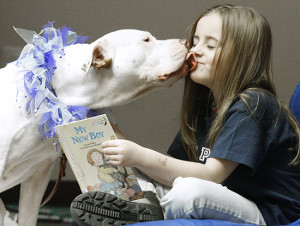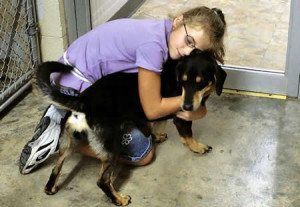Dog Shelter Adoption: 10 Questions to Ask
That exciting day has arrived. You’re going to the shelter to pick out a dog. You’ve thought a lot about it; decided you are ready and can create the time to properly care for it. As you walk through the aisles of cages, your heart is breaking. You wish you could take them all home. But all of a sudden, you see this face, gazing at you intently. The eyes are tentative, filled with some fear, but the tail starts slowly wagging as you walk over. And, as the pup sniffs your hand through the bars, you feel the gentlest lick. This could be the one. So what now? There’s important information you need to know to make a conscious choice. When it comes to dog shelter adoption, I’ve researched 10 good questions ask the staff before you take your new friend home.
1) How long has the dog been at the shelter?
This can tell you whether it’s been days, weeks or months that the dog has been living in a cage and subject to the stresses of being in a shelter. Hopefully, it’s a shelter where the staff try to make the dogs as comfortable as possible and they get out for exercise. Even if the dog has been there for awhile, with patience, love and guidance, they can blossom into an amazing member of the family.
 2) What kind of personality has the dog exhibited?
2) What kind of personality has the dog exhibited?
This is critical and the more you can find out, the more educated a choice you can make. It’s important to know what kind of dog suits your own personality and your lifestyle. Are you looking for a very affectionate dog or is a quiet and reserved dog more your style? You can also get some insight into whether the dog has exhibited any aggressive behavior, is fearful or is an open, friendly dog.
3) What’s the dog’s history?
Another critical piece of information to garner, if possible. Was there abuse involved and what could that mean in terms of behavior? Or did the dog have to be given up by a family who loved her? Generally, puppies, because they are still so young, can overcome a negative environment. Older dogs may take more time, patience and work and some never fully recover. It depends on what you want, and are prepared to give. Opening your heart and home to a dog in need is a beautiful thing. You want to make sure it’s as good a fit as possible.
4) What is the approximate age of the dog?
Although shelters can only give you a general age range because, usually, shelter dogs are found not brought in by families who know them well, they can still give you a pretty good idea. If you’re interested in getting a puppy, or giving a senior dog a home, this piece of information will be important.
5) What is the medical condition of the dog?
If the shelter is aware of any health issues the dog has, you will need to consider vet bills and the care that goes with managing whatever that condition may be. Again, giving a dog most wouldn’t adopt a home is a wonderful thing to do. Just go into it with eyes wide open. Sometimes, adopting a dog who needs you even more than a healthy dog would, can create an even deeper bond.
6) Is the dog very active or not?
This, again, is a lifestyle issue. If you’re looking for a quiet dog, you don’t want to get home and find the dog is bouncing off of the walls. Either way, I’m sure there will be an adjustment period. The dog may be nervous or anxious when going into a new home with what is, essentially, a stranger. So, if you’re told the dog is calm by the shelter, I would give the dog a chance to settle down. That could take weeks or a couple of months, but I think as time goes on and the dog gets into your routine, you’ll see exactly what kind of dog you have.
7) Is this dog good with kids and other pets?
If you don’t have children or any other animals at home, this isn’t as much of an issue. But it is still an important piece of information to know. Because dogs come into contact with so many other dogs and cats in shelters, aggression towards other animals should be something the shelter can discuss with you. Does the dog interact well with others? Is it friendly? Is it fearful? Has it come from a family with kids or other dogs or cats? Find out as much as you can.
8) Is the dog spayed or neutered?
Usually, if the pup came from a family, it would’ve been. But, if not, sometimes the shelter will do the procedure. Sometimes, they will give a discount on it or refer you to a veterinarian.
9) Has this dog been trained at all?
The shelter handlers usually see what, if anything, the dog knows in the way of commands. So they should be able to tell you if the dog has been trained. This will give you a good idea how far along they are, and what you’ll need to do moving forward.
 10) What is the shelter’s return policy?
10) What is the shelter’s return policy?
While most people don’t go into adopting a dog with the intention of returning it, sometimes the dog’s personality, activity level or needs aren’t, ultimately, a good fit for a particular person or family. It’s a shame, but the dog deserves a loving home where it is not only accepted, but cherished.
In closing, a suggestion would be, through the entire process, to observe, observe, observe. If you’re watching closely, there’s a lot you can tell. Good luck! When you find “the one”, what a blessing it will be to have each other.
What questions would you ask? Would love your thoughts and comments.
Until next time…









